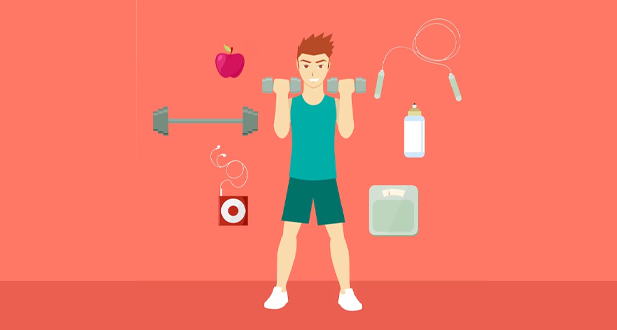
How to keep your Body Fit?
We began working from home, away from the institution, and limiting our social interactions at this turning point. Because we stay home and are forced to consume the meals that have been sitting in our fridge or pantry for a while, as well as because we are depressed, anxious, and stressed, we briefly lead a sedentary lifestyle with higher odds of physical inactivity, excessive eating, and sitting.
During the epidemic, many of us will likely gain weight and possibly keep doing so. Serious health dangers could result from this, such as type 2 diabetes, hypertension, heart attacks, strokes, and other illnesses. I’d like to provide some general guidance and tools for adopting a socially reclusive lifestyle while leading a healthy lifestyle, maintaining a healthy weight, and being generally well-adjusted.
Eating for Healthier Living
The finest scientific guidance available today on food selection for boosting health, preventing disease, and maintaining or reducing weight may be found in these recommendations. These are fundamental principles that most healthy people should follow. For specific advice, if you have a chronic illness or other unique nutritional requirements, speak with a qualified dietitian.
Aim for Fitness
- To keep or achieve a healthy weight.
- Engage in daily physical activity to bring enjoyment and fun back into your life.
- Get at least 30 minutes of daily, five days a week, moderate to intense exercise.
- Proper food gives you the enduring energy you need to exercise.
- Exercise, a balanced diet, downtime, and effective coping mechanisms can all help you manage your stress.
Create Healthy Eating Routines
- Eat a variety of vegetables, but focus on dark green, red, and orange ones (3 or more servings a day).
- Consume a range of fruits (2 or more servings a day).
- Consume whole-grain products that are high in fiber (3 to 6 servings a day). Refined or processed carbs should be reduced or eliminated from your diet; instead, focus on whole grains.
- Consume low-fat or fat-free milk and dairy products.
- Many low-fat protein options are available, such as eggs, beans, chicken without skin, seafood, lean meats, unsalted nuts, seeds, and soy products. If you consume meat, choose white meat over red meat at least four times more frequently.
- Reduce your intake of trans-fats (such as partially hydrogenated oil) and saturated fats as much as possible.
- Veggie oils should be used in place of solid lipids (such as olive or canola oil).
- Decrease your sodium or salt intake each day. If you are older than 50, have hypertension, diabetes, or chronic kidney disease, cut back to fewer than 1,500 mg per day.
- Limit or completely avoid “junk food,” which includes items made with refined white flour, solid or trans fats, extra sugar, and a lot of sodium.
- Limit or completely stop drinking sodas and other beverages with added sugar, which are heavy in calories and lack many or all nutrients.
- If you consume alcoholic beverages, do so sparingly. When it doesn’t endanger you or anyone else, only drink.
For weight loss
- Cut back on your daily calorie intake. Don’t “upsize” your meals at fast food places; instead, eat smaller servings.
- Observe the dietary recommendations above.
- Remove all sugar-sweetened beverages from your diet. You are allowed to consume one or two servings of unsweetened 100% fruit juice daily. Increase your water intake.
- Reduce your time spent watching television and other sedentary activities. Spend time away from the screen on fun things, housework, yard work, or hobbies.
- Spend 30 to 60 minutes daily, at least five days a week, engaging in moderate physical activity (such as walking, bicycling, swimming, or using aerobic exercise machines).
- Do muscle-toning and strengthening workouts at least two or three days each week.
Best Tips for Being Healthy and Fit
1. Get Enough Sleep: You need to obtain enough sleep in order to maintain your body robust and healthy.
Lack of sleep has a significant negative effect on the immune system, cardiovascular health, stress hormones, mood, cognition, metabolism, and other bodily functions. If a person gets at least 6 to 8 hours of slumber each night, their body can heal, rejuvenate, and repair itself.
2. Maintain a Healthy Diet: One of the best ways to stay healthy and active is to eat a balanced diet. Depending on the needs of the individual, a balanced diet contains a variety of foods in the appropriate amounts and qualities.
A balanced diet is easy to digest and contains the right quantities of proteins, vitamins, and minerals. This diet may differ from person to person depending on biological requirements (taking into account physical condition) and doctor consultation. People need to start depending on fresh fruits, vegetables, nuts, and seeds in addition to eating a balanced diet.
3. Regular exercise: Regular exercise is necessary to keep a healthy and fit body. If you can make time to exercise or go for a walk for at least 30min or an hour, you can lose more body weight, increase blood circulation, and strengthen your muscles.
People who are obese or heavily depend on poor diets frequently feel worn out, stressed out, and depressed. These people can only get past these issues if they exercise regularly and consume a nutritious diet. As a consequence, they will also experience healing, detoxification, and positive energy.
Those who engage in cardiovascular exercise can strengthen their hearts and lungs. On the other side, doing strength training can make muscles stronger. Stretching can also increase your flexibility while lowering your risk of harm. Exercise frequently to remain in shape and healthy.
4. Consume more water: There are several choices if you’re unsure of how to maintain your health. One such easy method is to stay moisturized. Water is the only beverage that can keep our systems hydrated and ensure that they are functioning at their peak.
To keep your energy levels and digestive system in good shape, drink at least 16 glasses of water daily. Drinking water helps the body’s inherent capacity to maintain moisture and remove toxins through the skin and urine. Consequently, drink a lot of water and let this natural organ cleaner do its thing.
5. Cleanse Your Body: One of the best ways to remain fit and healthy is to purify your body. Although both suggestions have the same objective—to aid in the body’s detoxification—they serve different functions and have various physiological effects. To detoxify your body, you need to eat a healthy diet that is high in fruits and liquids but low in spices.
This eating style promotes bloodstream cleansing and toxin removal, which leaves the body healthier, lighter, and better able to repair itself. Once all toxins have been removed, the body can rapidly regain health.
6. Avoid Skipping Meals: Do not skip meals, particularly breakfast, to maintain your health and fitness. Our bodies need breakfast to stay energized and fueled, which is necessary to sustain both physical and mental performance. This is essential to keeping a healthy weight because you won’t subsequently overeat to satiate your appetite.
7. Avoid Smoking and Drinking: One of the best ways to stay fit and healthy is to stop doing things like smoking and drinking that you can’t stop doing. The majority of Millennials and Gen Xers are reliant on alcohol and tobacco. These hazardous, lung-damaging behaviors are frequently brought on by peer pressure, anxiety, and other factors. Understanding the impact on the body will be made easier with the knowledge.
Tar, DDT, and carbon monoxide are only a few of the 400 poisons and more than 4000 chemical substances in cigarettes. People become hooked to cigarettes because of the nicotine in them. Smoking raises the risk of lung cancer, heart attacks, and strokes. Additionally, coronary artery disease can lead to the development of cancers of the mouth, esophagus, pancreas, uterus, etc.
Drinking has similar negative effects to smoking. Men who consume 15 or more drinks per week are deemed excessive, whereas women who consume seven or more drinks per week are deemed excessive. Drinking too much can lead to memory loss, liver cancer, cirrhosis of the liver, and other mental problems. So, stop imbibing and smoking, and start moving toward a fit and healthy lifestyle.
8. Practice meditation and yoga: There is no better way to remain in shape at home than to practice yoga and meditation. Studies have shown that practices like yoga and meditation, which improve mental clarity and help people repair themselves from the inside out, can improve health.
Also, practising yoga and meditation can have a positive impact on your life and cause major hormonal and physical changes. Also, it has been seen that those who practice yoga are better able to manage stress and sadness as well as develop hormonal balance, physical stamina, and flexibility. However, meditation improves cognitive performance and promotes the synchronization of the mind and body.
9. Take Probiotics: The foundation of being active is a healthy stomach. This is due to the gut being the second-most significant network in the body after the brain. Healthy gut flora and immune cells fight off pathogens like viruses, bacteria, and fungus.
Information from the gut’s nerves and hormones is sent to the brain, which is essential for maintaining general health. Additionally, it improves the digestive system while bolstering the immune, cardiovascular, and cerebral systems. Moreover, treating various allergens that the body has is crucial.
This introduction is essential because studies show that taking probiotics can aid in preserving a healthy balance of the good bacteria in the digestive system. Consuming probiotics, a specific category of bacteria, can be good for one’s health.
Conclusion:
I sincerely hope that the material above answers any queries you may have about keeping your health. Carefully read these techniques, understand their advantages, and incorporate them into your everyday life to maintain your health and fitness.



